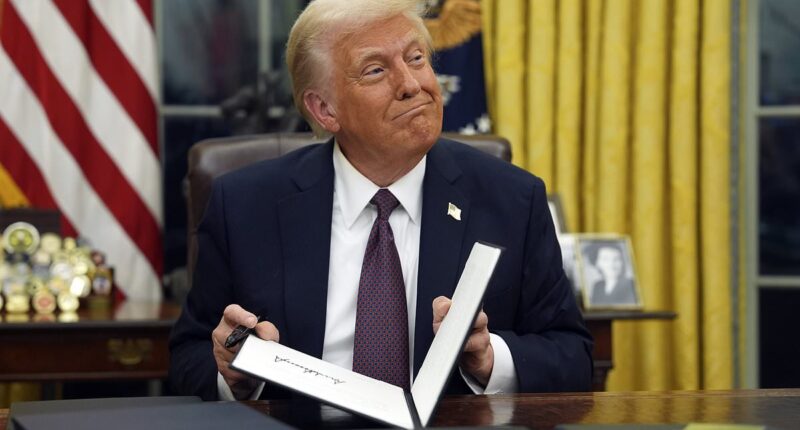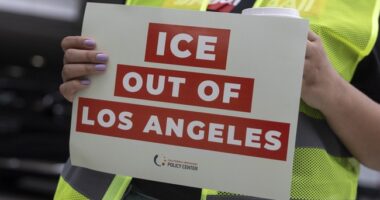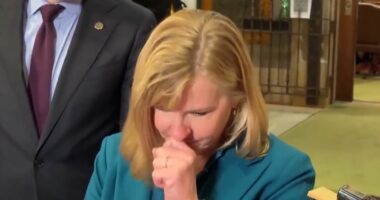President Donald Trump´s executive order terminating the constitutional protection of birthright citizenship was temporarily halted by a federal judge on Thursday, who deemed it ‘blatantly unconstitutional.’
Trump inked the order on his first day in office, declaring it would apply regardless of the parents´ immigration status.
Despite a Supreme Court precedent over 100 years old upholding birthright citizenship, this order marked Trump’s first executive action to face a legal challenge without the backing of outside groups or multiple states.
U.S. District Judge John C. Coughenour, appointed by Ronald Reagan, made this decision even though nearly half of respondents, 48 percent, expressed support for revoking birthright citizenship, with 26 percent strongly in favor, as per a poll by J.L. Partners for DailyMail.com.
By contrast, 32 percent said they opposed it, 23 percent strongly.
The federal judge ruled in the case brought by the states of Washington, Arizona, Illinois and Oregon, which argue the 14th Amendment and Supreme Court case law have cemented birthright citizenship.
The delay will put the order on ice until the judge can hear oral argument. But the 84-year-old made his first impression clear, granting a motion assuming the likelihood that plaintiffs will prevail.
‘I have been on the bench for over four decades. I can’t remember another case where the case presented is as clear as it is here …This is a blatantly unconstitutional order,’ he said.
Washington State AG Nick Brown and top law enforcement officers of other Democratic-run states had sought the 14-day stay.
The case is one of five lawsuits being brought by 22 states and a number of immigrants rights groups across the country. The suits include personal testimonies from attorneys general who are U.S. citizens by birthright, and names pregnant women who are afraid their children won´t become U.S. citizens.

President Donald Trump signed an order he says would end birthright citizenship for children born to parents who aren’t here legally. It drew an immediate legal challenge
Signed by Trump on Inauguration Day, the order is slated to take effect on Feb. 19. It could impact hundreds of thousands of people born in the country, according to one of the lawsuits. In 2022, there were about 255,000 births of citizen children to mothers living in the country illegally and about 153,000 births to two such parents, according to the four-state suit filed in Seattle.
Even when he signed it, Trump appeared to acknowledge its constitutionality wasn’t certain.
‘We think we have good ground,’ he said when asked about it would withstand constitutional challenge while inking the order in a marathon signing session Monday night shortly after taking office. ‘You could be right. We’ll find out,’ Trump said.
The U.S. is among about 30 countries where birthright citizenship – the principle of jus soli or ‘right of the soil’ – is applied. Most are in the Americas, and Canada and Mexico are among them.
The lawsuits argue that the 14th Amendment to the U.S. Constitution guarantees citizenship for people born and naturalized in the U.S., and states have been interpreting the amendment that way for a century.
The Supreme Court ruled in 1898 that children born to foreign parents inside the U.S. are citizens, citing the 14th Amendment.
The post-Civil War amendment states that ‘All persons born or naturalized in the United States, and subject to the jurisdiction thereof, are citizens of the United States and of the state wherein they reside.’

Mexican migrants, Laura Elizabeth and her son Matias keep warm by a fire while waiting to be apprehended by U.S. Customs and Border Patrol officers after crossing over a section of border wall into the U.S. on January 05, 2025 in Ruby, Arizona

Under the 14th Amendment all persons ‘born or naturalized in the United States’ are citizens
Trump’s order asserts that the children of noncitizens are not subject to the jurisdiction of the United States, and orders federal agencies to not recognize citizenship for children who don’t have at least one parent who is a citizen.
A key case involving birthright citizenship unfolded in 1898. The Supreme Court held that Wong Kim Ark, who was born in San Francisco to Chinese immigrants, was a U.S. citizen because he was born in the country. After a trip abroad, he faced being denied reentry by the federal government on the grounds that he wasn´t a citizen under the Chinese Exclusion Act.
But some advocates of immigration restrictions have argued that case clearly applied to children born to parents who were both legal immigrants. They say it’s less clear whether it applies to children born to parents living in the country illegally.
Trump´s executive order prompted attorneys general to share their personal connections to birthright citizenship. Connecticut Attorney General William Tong, for instance, a U.S. citizen by birthright and the nation´s first Chinese American elected attorney general, said the lawsuit was personal for him.
‘There is no legitimate legal debate on this question. But the fact that Trump is dead wrong will not prevent him from inflicting serious harm right now on American families like my own,’ Tong said this week.
One of the lawsuits aimed at blocking the executive order includes the case of a pregnant woman, identified as ‘Carmen,’ who is not a citizen but has lived in the United States for more than 15 years and has a pending visa application that could lead to permanent residency status.
‘Stripping children of the `priceless treasure´ of citizenship is a grave injury,’ the suit says. ‘It denies them the full membership in U.S. society to which they are entitled.’

















